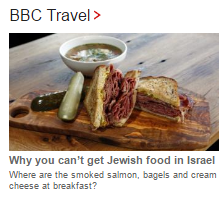Visitors to the BBC News and BBC Travel websites on June 14th were no doubt rather surprised to learn that “…you can’t get Jewish food in Israel”.

The article to which that link leads is headlined “Why isn’t there more ‘Jewish food’ in Israel?” and its by-line makes the unsupported claim that:
“One of the biggest shocks for many foreign visitors to Israel is the lack of familiar Jewish cuisine.”
The article’s Jerusalem-based Canadian writers Sarah Treleaven and Jamie Levin are not BBC journalists: the duo have published jointly written articles relating to Israel at various outlets in the past.
The article promotes two main notions – the first being that ‘Jewish food’ is of one particular genre.
“One of the biggest shocks for many foreign visitors to Israel is the lack of familiar Jewish cuisine. Where are the smoked salmon, bagels and cream cheese at breakfast? What about the delis that define Jewish cuisine from Montreal to Los Angeles? Or the kugel (a casserole made from egg noodles or potato), gefilte fish (an appetizer made from poached fish) and matzoh ball soup served at Jewish tables around the world?”
Traditional Sephardi and Mizrachi Jewish cuisine barely gets a mention.
“Later, as Jewish immigrants from Morocco to Ethiopia began piling in, each with their own unique style of cooking, the creation a national cuisine became ever more important.”
However, the ethnocentric writers apparently do not consider that cuisine to be ‘Jewish food’.
“In recent years, Israelis have developed a more diversified palate, with Thai and Mexican restaurants easy to find on the streets of Tel Aviv. Still, Jewish food remains scarce.”
But the main point of this article is promotion of the notion that European Jewish ‘settlers’ deliberately co-opted ‘indigenous Palestinian’ food. [emphasis added]
“The early Zionists eagerly adopted Palestinian dishes, such as falafel, hummus, and shawarma, while in recent years Israelis have developed a more diversified palate. Still, ‘Jewish food’ remains scarce. But very few visitors know the reasons behind the dearth of it in Israel: despite the fact that the early settlers were mostly Ashkenazi Jews from Eastern Europe, they forsook traditional Jewish food both because of scarcity but also in deliberate service to the formation of a new national narrative.”
“Early adherents to the Zionist project, committed to creating a Jewish state in the territory now known as Israel, sought to abandon vestiges of their past. Just as the European settlers favoured Hebrew over Yiddish and khakis over frock coats and homburgs, they also purposefully chose to eat indigenous foods over Ashkenazi ones.”
“The adoption of indigenous food lent the early European implants an air of authenticity. The production of local ingredients – the things that grew well in the desert and along the Mediterranean coastline, and the many dishes adapted from Arab kitchens – became part of the Zionist narrative.”
Shawarma is of course Turkish in origin and some consider falafel to have been invented by Egyptian Copts and hummus to also have originated in Egypt. Regardless of their actual origins, to describe those foods as “Palestinian dishes” is inaccurate.
But of course the purpose of that inaccuracy is to serve a transparent attempt to promote a blatantly politicised narrative of ‘indigenous’ Palestinians and “European implants” – and obviously BBC Travel had no problem with that.




